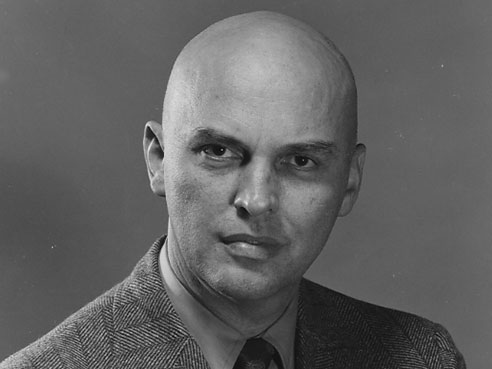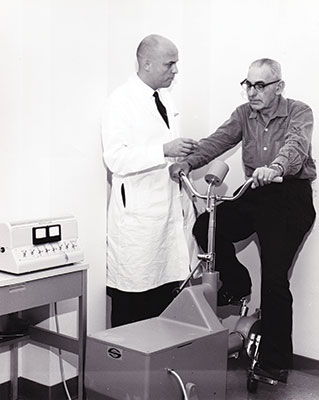 Ben Branscomb, M.D., 1924-2016. Photo courtesy of UAB Archives.Ben Vaughan Branscomb, M.D., a pioneering pulmonologist and professor at the University of Alabama at Birmingham for 51 years, passed away July 4. Branscomb, 92, was often referred to as the father of pulmonary medicine.
Ben Branscomb, M.D., 1924-2016. Photo courtesy of UAB Archives.Ben Vaughan Branscomb, M.D., a pioneering pulmonologist and professor at the University of Alabama at Birmingham for 51 years, passed away July 4. Branscomb, 92, was often referred to as the father of pulmonary medicine.
Born in Durham, N.C., in 1924, Branscomb entered Duke Medical School at the age of 17 due to the need for medical practitioners during World War II. He was recruited to the Medical College of Alabama by Dr. Tinsley Harrison upon completion of his residency training in 1955 and joined the faculty of what would become UAB. He was the founder and longtime chair of the UAB Division of Pulmonary, Allergy and Critical Care Medicine.
Contracting tuberculosis from a patient in 1948, Branscomb devoted himself to the study of lung disease during his recuperation. He pioneered the study of pulmonary function at the National Institutes of Health as the first pulmonary physician at NIH. He spearheaded efforts to establish pulmonary medicine as an independent discipline of medicine, as it had previously been a part of the field of cardiology.
Branscomb’s work at NIH illuminated fundamental aspects of breathing, leading him to publish the first descriptions of the flow volume loop, an integral part of modern pulmonary medicine. His research established substantive links between lung disease, smoking and air pollution.
A 1962 grant from the American Lung Association allowed him to mount a flow volume loop machine of his own design in a specially equipped bus to provide mobile testing and increased awareness of newly recognized pulmonary diseases such as emphysema and COPD. He tested more than 200 members of the 88th United States Congress on the Capitol steps in July 1963. National media coverage of the event put emphysema in the spotlight and challenged the safety claims of tobacco companies.
 Dr. Branscomb was often referred to as the father of pulmonary medicine. Photo courtesy of UAB Archives. Birmingham’s heavy industry created significant air pollution problems in the city during the 1950s and 1960s. Treating nonsmoking patients with breathing problems made Branscomb an advocate for clean air. He was the first physician on the state’s inaugural Air Pollution Control Board, and he led efforts to establish governmental enforcement of the Clean Air Act in Alabama. He was a founding member of the Greater Birmingham Alliance to Stop Pollution (GASP), an air-quality activist group.
Dr. Branscomb was often referred to as the father of pulmonary medicine. Photo courtesy of UAB Archives. Birmingham’s heavy industry created significant air pollution problems in the city during the 1950s and 1960s. Treating nonsmoking patients with breathing problems made Branscomb an advocate for clean air. He was the first physician on the state’s inaugural Air Pollution Control Board, and he led efforts to establish governmental enforcement of the Clean Air Act in Alabama. He was a founding member of the Greater Birmingham Alliance to Stop Pollution (GASP), an air-quality activist group.
“Ben Branscomb is widely recognized as one of the founding fathers of modern pulmonary medicine. He was an innovative thought leader who contributed not only to building one of the top pulmonary divisions in the country, but to improved health of the citizens of Alabama and the U.S. by championing the Clean Air Act of 1970,” said Victor Thannickal, M.D., the director of the UAB Division of Pulmonary, Allergy and Critical Care Medicine. “He was one of the first pulmonologists to widely utilize spirometric testing to screen for emphysema and chronic lung disease. His clinical acumen and his teaching of medical students, residents and fellows are legendary. He took time from his busy schedule to educate local schools in Birmingham and the public at large of the hazards of cigarette smoke and environmental pollution. He was a friend and enduring supporter of our division, the Department of Medicine and UAB. He will be dearly missed.”
Branscomb was one of the first UAB researchers to be appointed to an endowed chair, assuming the Alabama Professorship of Medicine in Emphysema and Respiratory Diseases, now known as the Ben Vaughan Branscomb Chair of Medicine in Respiratory Disease. He was the clinical director of the Spain Rehabilitation Center until 1977 and medical director of the Spain Respiratory Care Unit until 1989, when he retired from clinical practice. He continued teaching until 2006.
Among his awards are the Lifetime Achievement Award of the American College of Physicians, the Lifetime Achievement Award of the Birmingham Business Journal’s Health Care Heroes and membership in the Alabama Healthcare Hall of Fame.
Memorial service and visitation to follow will be held at 10 a.m. Saturday, July 16, at Vestavia Hills United Methodist Church. Memorial contributions may be made to the Black Warrior Riverkeeper. Donations for medical education may be made to the Branscomb Education Fund in Pulmonary Medicine through the UAB Development Office.